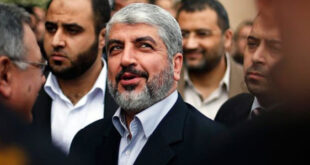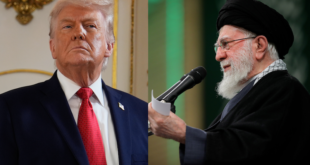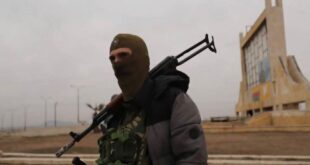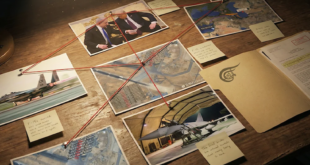TEHRAN (AFP) — Iran announced Tuesday it had successfully tested a new solid fuel missile motor for its arsenal of medium-range ballistic missiles, a technological breakthrough that sparked fresh alarm in Israel.
“It was a test of a motor and not a test of a missile,” a defence ministry official told AFP, clarifying earlier reports in the Iranian press that a missile itself was tested on Sunday.
A defence ministry statement quoted Defence Minister Ali Shamkhani as saying that “the more durable fuel allows the missile to be more accurate,” and said the new technology could be built into Iran’s Shahab-3 missiles.
The test was “100 percent successful,” Shamkhani said. The ministry also denied a report on Iranian state television that a “two-stage rocket motor” — in theory for a missile capable of hitting Europe — had been tested.
Iran says the Shahab-3 has a range of at least 2,000 kilometres — meaning that arch-enemy Israel and US bases in the region are well within range.
The country has recently upgraded the Shahab-3 ballistic missile, a single-stage device believed to be based on a North Korean design. Up to now it has been based on liquid-fuel technology.
Military experts contacted by AFP said the test, if indeed successful, would signify an important breakthrough for the Islamic republic’s missile programme.
Firstly, in order to develop a missile with a range greater than 2,000 kilometres — in effect a two-stage rocket — a country needs to master the more complex solid fuel technology.
Iran has, however, denied developping a missile with a reach beyond the Middle East region.
“The maximum range of a single stage missile is around 2,000 kilometres. In order to send a missile further, you need a twin stage design that separates in mid flight,” said one analyst.
“This separation is very complex, and in order to maintain the accuracy of the missile, it needs to be using solid fuel. In very simplistic terms, think of a liquid fuel missile as a bottle of mineral water — the liquid is sloshing around and makes the bottle unstable,” he said.
“And even if the missile is only a single stage design, solid fuel makes it more accurate,” he added.
Secondly, solid fuel missiles of all ranges are more mobile and can be deployed far more quickly than liquid fuel devices, which need to filled up immediately before they are launched.
“It makes the missiles far more portable. It makes missile deployment much quicker. It makes missile deployment teams,” a military analyst said.
Tehran’s rapid progress on its ballistic missile programme is a major cause for concern among the international community, particularly Israel, which is already alarmed over Iran’s nuclear activities.
Britain, France and Germany are currently engaged in a tough diplomatic effort to resolve the nuclear issue without recourse to the UN Security Council and possible sanctions.
In a quick reaction to the latest Iranian test, Israel warned the “free world to beware of Iran’s plans.”
“We are closely monitoring these worrying projects being plotted in Iran,” said one senior Israeli official contacted by AFP.
“Iran is trying to develop a nuclear weapon and is developing its vectors to this end. Its ballistic missiles do not only threaten Israel: they can also be turned on Europe,” he added.
Iran insists it is not seeking to develop missiles with a longer range than the Shahab-3, and has denied allegations that it is seeking to develop nuclear weapons. The country says its missiles will only be tipped with conventional warheads.
But many are not convinced: as one Western diplomat in Iran has remarked, “why develop a Rolls Royce to only deliver a pizza?”
‘Some progress’ in nuclear talks — Bush
WASHINGTON (AFP) — US President George W. Bush said Tuesday “some progress” had been made in trying to persuade Iran to give up its nuclear ambitions and diplomacy remained the approach in convincing North Korea to abandon its nuclear programme.“We’re working with the ‘EU-3’ to hopefully convince the Iranians to abandon their pursuit of such a programme,” Bush said at a White House press conference. “And it appears we’re making some progress.
“I’ve always believed that, obviously, the best way to solve any difficult issue is through diplomacy,” the president said.
“And in this case, France, Great Britain and Germany are handling the negotiations on behalf of the rest of the world, which is those nations which are deeply concerned about Iran having a nuclear weapon,” he said.
“Now, our policy is very clear on that, and that is that the Iranians violated the NPT agreement, we found out they violated the agreement, and therefore they’re not to be trusted when it comes to highly enriched uranium or highly enriching uranium,” the US president said.
“And therefore our policy is to prevent them from having the capacity to develop enriched uranium to the point where they’re able to make a nuclear weapon,” he said.
Bush added that a decision to allow Iran to apply for membership in the World Trade Organisation (WTO) “seemed like a reasonable decision to make in order to advance the negotiations with our European partners.”
On North Korea, Bush stressed his commitment to diplomacy and the six-party talks in persuading Pyongyang to abandon its nuclear ambitions.
“We’ve got a lot of work to do with the North Korean [leader Kim Jong-Il] because he tends to ignore what the other five nations [China, Japan, Russia, South Korea and the United States] are saying at times,” Bush said.
“But that doesn’t mean we’re going to stop, and can continue to press forward to making it clear that if he expects to be treated as a responsible nation that he needs to listen to the five nations involved,” Bush said.
“And it’s important to have China at the table, for example, saying the same thing that the United States is saying, and that is that, ‘If you want to be a responsible nation get rid of your weapons programmes,'” Bush said. “It’s important to have Japan and South Korea and Russia saying the same thing.
“We want diplomacy to work,” he added. “And we want diplomacy to be given a chance to work, and that’s exactly the position of the government. And hopefully it will work. I think it will.”
“It’s either diplomacy or military,” Bush said. “And I am for the diplomacy approach.
“And so for those who say that we ought to be using our military to solve the problem, I would say that while all options are on the table, we’ve got a ways to go to solve this diplomatically.”
 Eurasia Press & News
Eurasia Press & News



